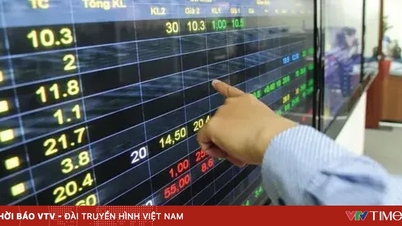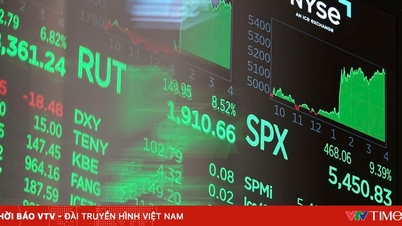
VN-Index has increased for more than 5 months if counting the April bottom without any major correction of over 10%. This is one of the fastest and strongest increases in the history of the Vietnamese stock market with the main driving force coming from domestic cash flow.
The above increase is considered "very hot" by many analysts and has reflected all expectations and supporting information. Therefore, the risk of a strong market correction is not small.
Last week, VN-Index had many fluctuations when the opening session was under strong downward pressure and quickly recovered to around 1,660 points in the last sessions of the week thanks to good demand from some large-cap stocks. Cash flow last week continued to be differentiated between industry groups, causing the market to fluctuate continuously.
CNBC quoted Wei Li, chief investment strategist at BlackRock Investment Institute, saying that volatility is inevitable in the stock market. The history of market development shows that volatility comes from many factors, which can be macro news or important national decisions, but can also be media analysis, or even unfounded rumors...
The question is how to avoid losing money when the stock market fluctuates?
In a report in early September, SGI Capital - the management company of The Ballad Fund - mentioned restructuring the portfolio and risk management as a priority measure during the potential risk of market correction. This not only preserves achievements but also helps investors have room to prepare for other great opportunities that lie ahead.
Last weekend’s report by Beta Securities (BSI) also suggested that investors should take advantage of the volatile times to restructure their portfolios, prioritizing stocks with solid fundamentals, good profit growth prospects and stable liquidity. In addition, it is necessary to maintain a reasonable amount of cash to be ready to disburse when there are reliable breakout signals.
Taking a broader view of any volatile period, Roger Young, head of global investment management at T. Rowe Price, told CNBC that instead of getting caught up in the noise when things get chaotic, make a plan now to prepare for market volatility. “It’s a good approach to get ahead of things, but be careful not to overreact to what might happen in the future,” he said.
It's easy to stick to an investment plan when the market is steadily rising. But when things start to fluctuate, emotions can take over, leading investors to make rash decisions, such as panic selling stocks when the market drops sharply.
“It's important to avoid overreacting or making overly emotional decisions,” says Mr. Young.
Investors need to try to be honest with themselves and find answers to the following questions: What would I do if the market fell 30%? Would it affect my life? Would it make me want to sell and give up at the wrong time?...
Answering these questions can help determine your risk tolerance. This is important because examining your risk tolerance can help you avoid making emotional decisions.
Generally speaking, the higher your risk tolerance – that is, you don't necessarily want to sell off and will even buy more investments if things get worse – the more your asset allocation can be devoted to more volatile assets like stocks. The lower your tolerance, the more you should invest in more conservative holdings like bonds.
If the thought of a significant market decline keeps you up at night, experts recommend selling off risky investments and putting that money into conservative investments.
In addition to planning your investments based on your risk tolerance, age and goals are also important. If you are 22 and investing for retirement, you can afford to take large losses in your portfolio with the assumption that things will recover and continue to grow over the next several years. If you plan to retire and start living off your portfolio this year, a 50% drop in the stock market is a huge blow to your life. In short, the earlier and more important your goals are, the less volatile your portfolio will be.
"In a volatile bear market scenario, it's a gift for young people," CNBC quoted David McInnis, a financial planner at Aristia Wealth Management, as saying.
Because stock market declines give investors the opportunity to buy at lower prices, thus increasing their long-term profits. But instead of trying to buy only when prices are low, the real key to navigating volatility is to buy all the time. He refers to the strategy of dollar cost averaging (DCA). Instead of buying a large number of stocks at once, investors can spread their holdings over several times, which helps minimize risk when the market is volatile.
“Perhaps this strategy is not new and innovative, but it is extremely effective,” the expert said.
PV - VNNSource: https://baohaiphong.vn/cach-phong-thu-khi-thi-truong-chung-khoan-bien-dong-522158.html




![[Photo] Hanoi morning of October 1: Prolonged flooding, people wade to work](https://vphoto.vietnam.vn/thumb/1200x675/vietnam/resource/IMAGE/2025/10/1/189be28938e3493fa26b2938efa2059e)
![[Photo] Keep your warehouse safe in all situations](https://vphoto.vietnam.vn/thumb/1200x675/vietnam/resource/IMAGE/2025/10/1/3eb4eceafe68497989865e7faa4e4d0e)

![[Photo] President of the Cuban National Assembly visits President Ho Chi Minh's Mausoleum](https://vphoto.vietnam.vn/thumb/1200x675/vietnam/resource/IMAGE/2025/10/1/39f1142310fc4dae9e3de4fcc9ac2ed0)






























































































Comment (0)